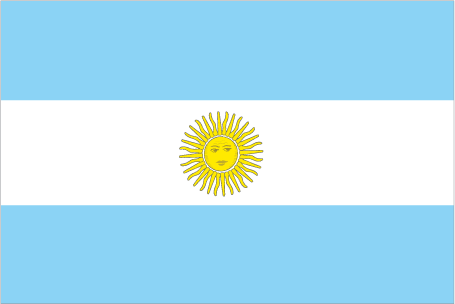
Argentina
Argentina, a country in South America, covers most of the southern part of the continent. As the eighth largest country in the world, Argentina is larger than Mexico and the US state of Texas combined. It includes vast plains, deserts, tundra and jungles, as well as high mountains, rivers and thousands of miles of coastline. Argentina also claims parts of Antarctica, as well as several islands in the South Atlantic, including the British-ruled Falkland Islands (Islas Malvinas).
Argentina has long played an important role in the history of the continent. After three centuries of Spanish colonization, Argentina declared its independence in 1816, and Argentine nationalists were instrumental in revolutionary movements elsewhere, a fact that made the writer 20th century Jorge Luis Borges observed that "South America's independence was, to a large extent, Argentina's. work. business." Torn by conflicts and sometimes wars between political factions demanding central power (based in Buenos Aires) or provincial autonomy, Argentina tends to experience periods of colonial rule. caudillo, or power, especially under the presidency of Juan Perón. The 1970s ushered in a period of military dictatorship and repression in which thousands of suspected dissidents "disappeared" or were murdered; this ended in the disastrous Falklands War of 1982, when Argentina invaded the South Atlantic islands it claimed as its own and was defeated by the British. forces in a short but bloody campaign to restore the military regime and restore democracy, which had survived despite numerous economic crises.
The country's name is derived from the Latin word for silver, argentum and Argentina is indeed a valuable source of minerals. More important, however, is Argentina's livestock production and grain production, once ranked among the wealthiest countries in the world. Much of this farming took place in the marshes, the rich grasslands that were once the domain of the nomadic Native Americans, then the rude cowherds, who in turn were forever engraved. recorded in the romantic literature of the country. As Borges describes them in his story The South, Pampa stretches endlessly to the horizon, overshadowing the man within it; traveling from the capital to Patagonia, the story's protagonist, Señor Dahlmann, “saw people driving on dirt roads; he saw ravines, lagoons and farms; he saw long, glowing clouds that looked like marble; and all of this is coincidental, like dreams of plains... Elemental Earth undisturbed by colonies or other signs of humanity. The country is vast, but at the same time intimate and to some extent secretive. The land of no bounds sometimes contained only a lone bull. The loneliness was perfect and possibly hostile, and Dahlmann might have thought he was traveling in the past and not just south. Argentina, a country in South America, covers most of the southern part of the continent. As the eighth largest country in the world, Argentina is larger than Mexico and the US state of Texas combined. It includes vast plains, deserts, tundra and jungles, as well as high mountains, rivers and thousands of miles of coastline. Argentina also claims parts of Antarctica, as well as several islands in the South Atlantic, including the British-ruled Falkland Islands (Islas Malvinas).
Argentina has long played an important role in the history of the continent. After three centuries of Spanish colonization, Argentina declared its independence in 1816, and Argentine nationalists were instrumental in revolutionary movements elsewhere, a fact that made the writer 20th century Jorge Luis Borges observed that "South America's independence was, to a large extent, Argentina's. work. business." Torn by conflicts and sometimes wars between political factions demanding central power (based in Buenos Aires) or provincial autonomy, Argentina tends to experience periods of colonial rule. caudillo, or power, especially under the presidency of Juan Perón. The 1970s ushered in a period of military dictatorship and repression in which thousands of suspected dissidents "disappeared" or were murdered; this ended in the disastrous Falklands War of 1982, when Argentina invaded the South Atlantic islands it claimed as its own and was defeated by the British. forces in a short but bloody campaign to restore the military regime and restore democracy, which had survived despite numerous economic crises.
The country's name is derived from the Latin word for silver, Argentum and Argentina is indeed a valuable source of minerals. More important, however, is Argentina's livestock production and grain production, once ranked among the wealthiest countries in the world. Much of this farming took place in the marshes, the rich grasslands that were once the domain of the nomadic Native Americans, then the rude cowherds, who in turn were forever engraved. recorded in the romantic literature of the country. As Borges describes them in his story The South, Pampa stretches endlessly to the horizon, overshadowing the man within it; traveling from the capital to Patagonia, the story's protagonist, Señor Dahlmann, “saw people driving on dirt roads; he saw ravines, lagoons and farms; he saw long, glowing clouds that looked like marble; and all of this is coincidental, like dreams of plains... Elemental Earth undisturbed by colonies or other signs of humanity. The country is vast, but at the same time intimate and to some extent secretive. The land of no bounds sometimes contained only a lone bull. The loneliness was perfect and possibly hostile, and Dahlmann might have thought he was traveling in the past and not just south.









